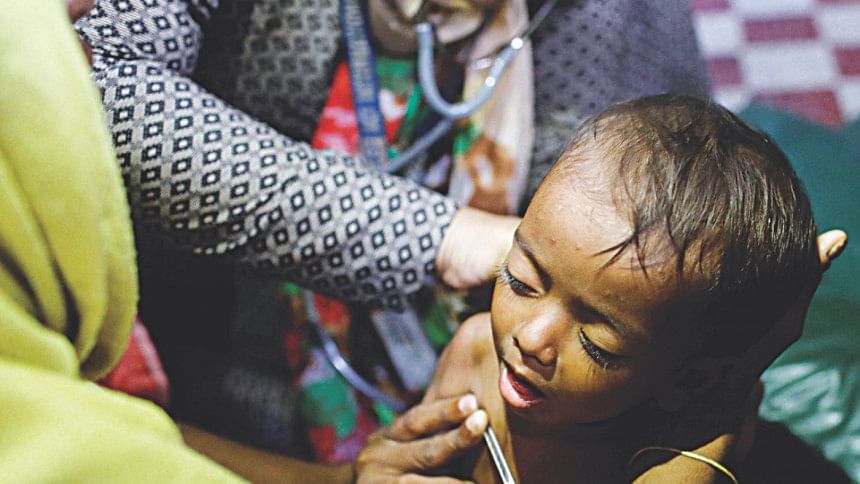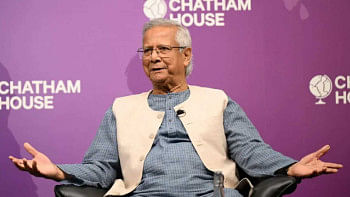No real progress yet

Rohingyas have been telling the world numerous stories of horror, loss, murder, rape and villages burned to the ground over the last two months. The world's media have been flooded with their harrowing tales.
The atrocities being carried out by the Myanmar military since August 25 have been termed "a textbook example of ethnic cleansing" by the UN and "genocide" by different human rights bodies.
Yet, there has been no real progress in resolving the world's fastest growing humanitarian crisis.
As the global outcry fails to force Myanmar to end the atrocities, their flight continues, increasing the number of refugees in Bangladesh.
The crisis has been crying out for strong global action for a solution. But the actions remain inadequate.
In fact, the role of UN Security Council has been appalling. It was able to issue only a statement in mid-September, expressing concern over "excessive violence" by Myanmar security forces in Rakhine State, home to the majority of Rohingyas.
At the end of September, the UNSC discussed the crisis in an open meeting, but failed to take any decision due to China and Russia's opposition. That was all.
No further action was seen in the last three weeks while the atrocities continued unabated. UN Chief Antonio Guterres and other top UN officials' repeated calls for suspension of military action against the Rohingyas fell flat as UNSC did nothing.
Unless China and Russia--two permanent members of the UNSC with veto power--change their minds and refrain from supporting Myanmar, it is almost impossible for the council to do something to stop the exodus and pave the way for their voluntary return to their homeland.
Amid this situation, a ministerial-level conference on the crisis will be held in Geneva today to collect funds for humanitarian aid.
The conference, co-hosted by the European Union and the government of Kuwait, and co-organised by three UN agencies--UNHCR, IOM and OCHA, is being held to raise $434 million. But commitments so far have been made only of $116 million.
The UN agencies have plans to provide humanitarian aid till next February.
Humanitarian aid alone is not a solution to the crisis. It will help Rohingyas survive the next six months. What happens after February is still uncertain. But that Bangladesh will have to bear the brunt in the coming days is certain.
Everybody knows the root causes of this crisis are in Myanmar. But the lack of collective effort, particularly the failure of the UNSC to take decisive action, keeps allowing Myanmar to continue its ethnic cleansing before the eyes of world leaders, who have repeatedly promised in the past to take action on genocide.
After failing to stop genocides in Rwanda and Bosnia in the 1990s, the UN renewed its commitments and developed new mechanisms, including an office of the UN special advisor on prevention of genocides.
World leaders at the United Nations World Summit in 2005 agreed that the international community has a responsibility to use appropriate diplomatic, humanitarian and other means to protect populations from genocide and crimes against humanity.
The leaders also promised to be prepared to take collective action in accordance with the UN charter when a state manifestly fails to protect its population.
That the efforts bore no fruit was exposed by the UN and international communities' failure to protect Rohingyas. They are being treated by the Myanmar military in the same way as the Hutus treated the Tutsis like insects during the Rwanda genocide.
For their failure in Rwanda, Boutros Boutros-Ghali and Kofi Annan, both chiefs of the UN, and several world leaders apologised a few years after the genocide.
"The United Nations and its member states failed Rwanda and its people during the 100-day genocide and expressed 'deep remorse' that more wasn't done to stop it," Annan said in a statement in 1999.
On a 1998 state visit to Rwanda, former US president Bill Clinton apologised for inaction to prevent the genocide in 1994.
“It may seem strange to you here, especially the many of you who lost members of your family, but all over the world there were people like me sitting in offices, day after day after day, who did not fully appreciate the depth and speed with which you were being engulfed by this unimaginable terror,” Clinton said.
Annan's successor Ban Ki-moon in 2014 said, "The UN is still ashamed over its failure to prevent the 1994 genocide in Rwanda."
With the memories of Rwanda and Bosnia still there, the genocide should not have taken place in Myanmar. The world leaders should have taken prompt action to stop Myanmar military.
But the harrowing tales of Rohingyas show how the world leaders failed to deliver on their promises.
Will they apologise in future for their failure? It would seem like they prefer apologising or saying sorry over taking actions.

 For all latest news, follow The Daily Star's Google News channel.
For all latest news, follow The Daily Star's Google News channel. 








Comments